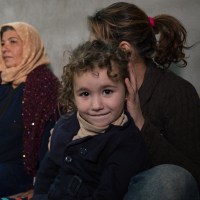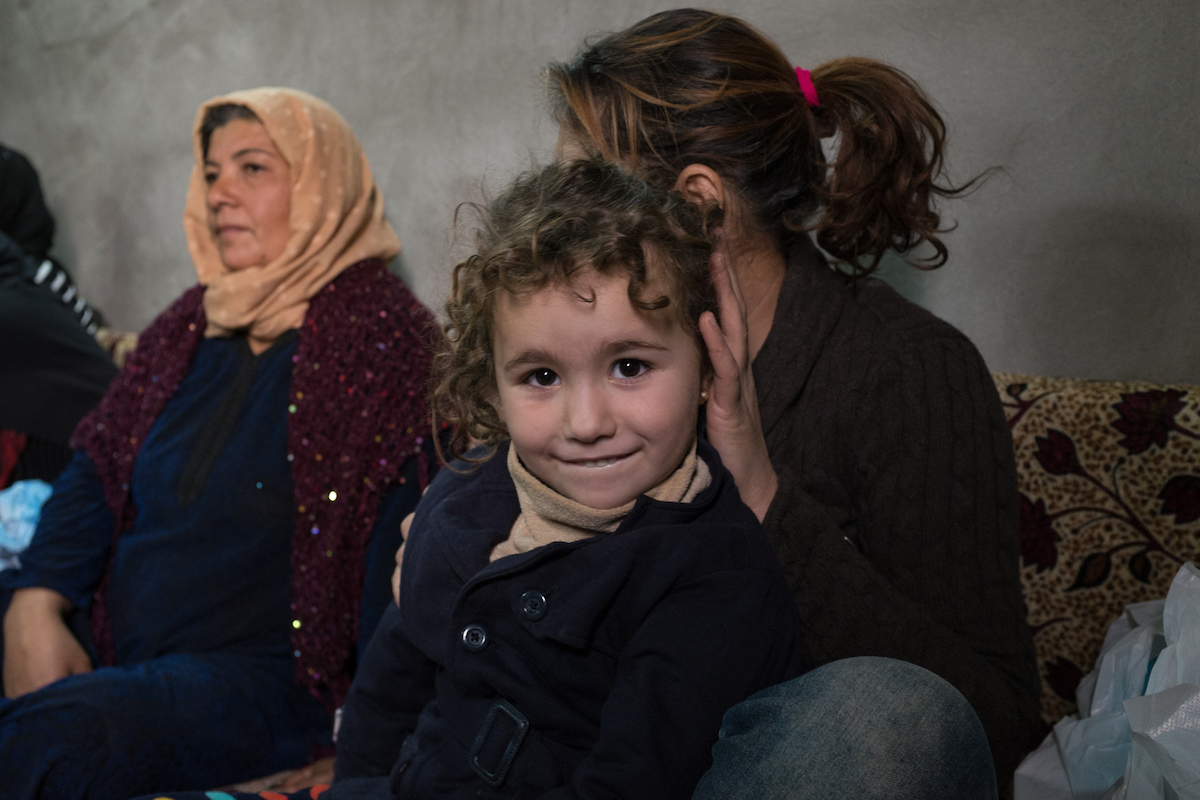Four of the fingernails on my right hand—and a good portion of the surrounding skin—are freshly painted purple. Toleen, four years-old and not yet skilled with the tiny brush in the bottle of nail polish we gave her a few days ago, decides she has finished my impromptu manicure. She climbs up into her mother’s lap and settles in for a few moments.
Her mom, Abeer, buries her face into her daughter’s messy curls, barely held back by a yellow plastic hair band. Toleen is her treasure.
Six of us sit together in Abeer’s home including her daughter and a neighbor who brought a tray of tiny glasses filled with potent coffee and a single glass of water to share. It’s cozy.
Abeer’s single-room concrete block home is about as long as an eight-man camping tent, but not nearly as wide. There is no kitchen, no bedroom. Just a single, small space with sleeping mats on the floor, a cooler of water in the corner, and clothes hanging high on the wall from a handful of nails.
Abeer’s situation sure seems bleak.
But the only thing Abeer, a Syrian refugee now living in Iraq, has ever asked us for is opportunity.
When Abeer arrived from Syria a little over a year ago, she was cautiously optimistic. She pounded the pavement every day, handing out her resume to every business that might be hiring. She had a degree, which gave her a leg up on many of the other refugees also looking for work. She couldn’t have known that she was trying break into a tight job market during a long, crippling financial crisis here in Iraq.
No one was hiring.
It’s a little more than a year later now—a year that has been unrelentingly brutal.
Abeer tells us about losing her husband and bearing sole responsibility for her daughter. We pass around her phone, showing a photo of her father in a hospital bed in Germany. He recently had brain surgery and isn’t doing well.
Alone in the refugee camp, Abeer is vulnerable. Neighbors who think she doesn’t deserve a home for just her and her daughter—who want her tiny space for themselves—call the police regularly, telling untrue stories in hopes of getting her evicted.
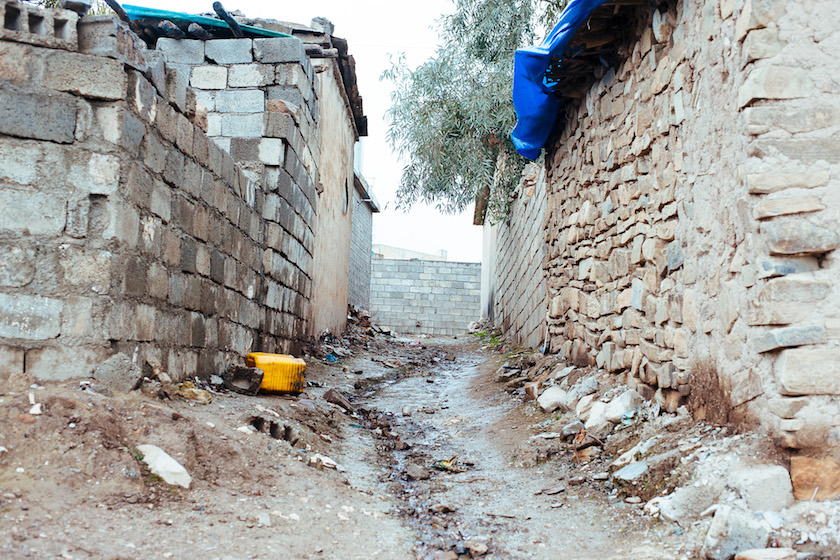
She tells us about a fire that broke out a few weeks earlier, that nearly took her daughter’s life. “My neighbors pulled her out of the burning room,” she says. “There was so much smoke!”
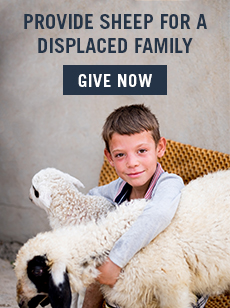
A fire at the home next to hers grew so big that it crossed their adjoining fence and burned a little lean-to Abeer had added to her single room. Toleen was playing inside the structure when the fire broke out. After the fire, Abeer worked hard at cleaning up her property and making it safe for her daughter. Unfortunately, she erased all evidence of loss, and wasn’t compensated for anything that burned in the fire. She sold her only barrel of kerosene—fuel that would keep them warm this winter—to replace what they needed most.
Over the course of the conversation, in the lulls when we play games with her restless daughter, we ask Abeer about herself. We ask what brings her joy, what she liked to do as a teenager. She doesn’t seem to understand the questions. But when we ask about her hopes for the future, everything comes into razor-sharp focus:
She wants more than anything to provide a good life for her daughter.
Abeer dreams of getting her daughter into a good kindergarten—getting her a good education. She dreams of traveling away from here, and when Syria is safe again, some day, she dreams of going back.
She wants to earn a living to take care of Toleen.
The sewing machine you provided Abeer—empowering her to do just that—sits on its stand at the moment, just inside the door. “I LOVE to sew!” Abeer says, brightening.
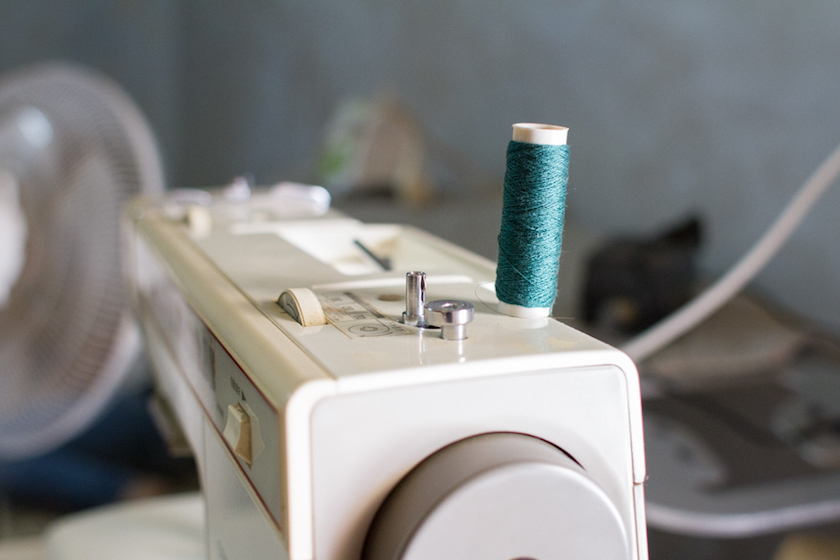
She loves to make things for her daughter, to crochet and sew sparkly designs. For a long time, she couldn’t sew—she took a course back in Syria but didn’t own a machine. Now, finally, she can use her skills to create for her daughter and for others in the camp. With a little support, she can earn what she needs to get by.
Parts of Abeer’s story are obviously painful. “The full stomach doesn’t understand the empty one,” she says about those who don’t know what it’s like to be a refugee.
But Abeer tells her story in such a matter-of-fact way.
She never asks to be rescued. She refuses to yield to hopelessness and continues to look for opportunity—with both eyes fixed on creating a good future for her daughter.
Help empower moms like Abeer to create a good life for their families. Give today.

